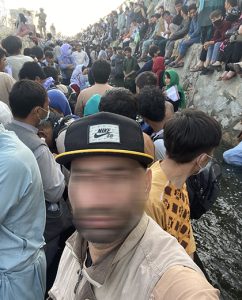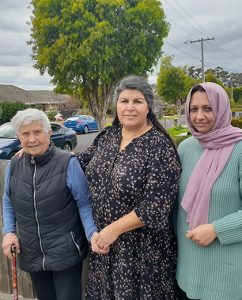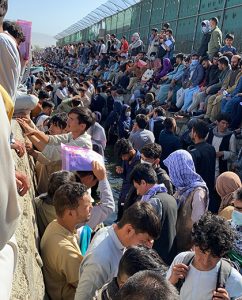Neighbours step up to support Afghan evacuee family
When Afghan evacuee ‘Abdul’ and his family moved into his first Australian home in a quiet street in Glenroy, in Melbourne’s north, he was not expecting the welcome he received.
The residents of the street – themselves mostly migrants, or the children of migrants, from across the globe – held a meeting to work out how they could help. Then they set to work.
“On the Friday afternoon we moved into the house, we realised the electricity had not been turned on. My neighbour, who had come over the welcome us, said ‘don’t worry’ and he ran a heavy duty electrical cable over from his property so we would have power,” ‘Abdul’ said.
“I couldn’t believe it. Other neighbours brought candles and food for us,” said ‘Abdul’, whose identity is not being revealed to protect the safety of relatives still living under the brutal Taliban regime.
“The next morning my neighbour made a phone call and after 30 minutes, the electricity was connected – and this was our first day,” he said.
 “Our neighbours donated furniture. Even though we had been supplied with furniture from the AMES, they brought more.
“Our neighbours donated furniture. Even though we had been supplied with furniture from the AMES, they brought more.
“One neighbour said ‘you don’t have a microwave, here’s a microwave’. Another neighbour has a daughter who is doctor and she offered medical help if we needed it.
“The neighbours have been wonderful. We never expected it. They have done everything for us. They even brought us lunch boxes and school bags for the kids.
“This is what we are seeing in Australia. We never expected it. I’m thinking that our neighbours are very good, caring people. I’m very grateful and we are happy to be in Australia,” Abdul said
Abdul and his family were forced to flee their home and leave everything behind when the brutal fundamentalist Taliban regime took control of Afghanistan last August. As a UN employee who worked with foreign governments, Abdul became a target of Taliban militia.
The family are among hundreds of thousands of Afghans who have fled their homeland since the Taliban seized control on August 15, last year, amid dramatic scenes.
“I had a great life in Afghan for 20 years in the Karzai era. But unfortunately that has changed with the recent situation and the return of the Taliban,” Abdul said.
Abdul worked in operations with the UN office in Kabul.
 “I worked with people from Australia, Europe and the US. That is why I was in danger after the Taliban returned. Everyone knew I was working with foreigners,” he said.
“I worked with people from Australia, Europe and the US. That is why I was in danger after the Taliban returned. Everyone knew I was working with foreigners,” he said.
Abdul said his priority was and is his children whom he wants to have opportunities no longer available in Afghanistan.
“I gave all my life for my kids. My priority was to work hard for my kids so they could have a better future. I have three daughters and they were all studying. That stopped when the Taliban came back.
In August last year as the Taliban were retaking Kabul, Abdul received a message from the Australia embassy that he should go to the airport.
He and 16 of his immediate family members immediately headed to the airport. Abdul stood for 11 hours in filthy water in a sewage drain desperately trying to contact Australian troops and get into the airport.
After finally making contact with an Australian soldier, Abdul was told the email he had received from the embassy as a fake.
“It was crazy and confused. People with legal documents were left behind and other people with no documents at all were able to get out,” Abdul said.
The family retreated home and 24 hours later a massive blast just outside the airport perimeter killed 250 people.
With air evacuation over, Abdul moved his family to a provincial part of Afghanistan and he effectively went into hiding.
“For two and a half months I was travelling with some colleagues, staying away from my family.
“Then, finally I got a chance to go to Pakistan. And after the Australian High Commission in Pakistan issued us with documents and we were able to get visas to go to Pakistan.
“But my eldest daughter was stopped at the border because the border officials said there as something wrong with her visa. She had to go back to Afghanistan and she is living with relatives.”
 The family was able to cross the border into Pakistan and reach Islamabad. The Australian High Commission organised accommodation and flights to Australia. The family arrived in Australia on November 26.
The family was able to cross the border into Pakistan and reach Islamabad. The Australian High Commission organised accommodation and flights to Australia. The family arrived in Australia on November 26.
Abdul says he wants to bring his eldest daughter to Australia and is looking forward to improving his English and finding a job.
“I am a worker and as soon as I can I will get a job and support my family,” he said.
“My children will continue their education and my wife wants to get a job because she has never had a chance to work – it is difficult for women to work in Afghanistan.
“She has a diploma and a bachelor of business administration and she would like to get a job,” Abdul said.
Neighbour Hamida Uzel coordinated the efforts to help Abdul and his family in her home just down the street.
“I met Abdul for the first time when he was going shopping with his trolley. He said hello to me and introduced himself as my new neighbour,” Hamida said.
“A few days later I was gardening in my front yard and Abdul’s kids were playing. They asked if I wanted some help and they helped he plant from succulents around my letterbox,” she said.
“I invited them over for hot chocolate and it was then that I found that they were a refugee family. I asked if they needed anything. They didn’t answer but looked at each other – that answered the question for me,” Hamida said.
It was then that the neighbours swung into action providing and extra TV for the kids and dining suite seating eight – for the family of seven.
“Other neighbours dropped off things at my house and we got everything Abdul and his family needed,” Hamida said.
“I felt like I had to help them. I saw the kids and my heart said that I had to do something,” she said.
“We all need a place to call home,” said Hamida, who came to Australia as young child from Turkey in 1970.
Italian born neighbour Nona Rosa has been giving Abdul’s children ice creams and other treats.
“They are lovely people. We are lucky to have them living amongst us,” she said.












